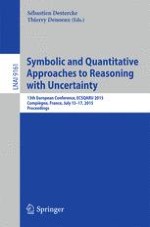2015 | OriginalPaper | Chapter
Learning Contextual Discounting and Contextual Reinforcement from Labelled Data
Authors : David Mercier, Frédéric Pichon, Éric Lefèvre, François Delmotte
Published in: Symbolic and Quantitative Approaches to Reasoning with Uncertainty
Publisher: Springer International Publishing
Activate our intelligent search to find suitable subject content or patents.
Select sections of text to find matching patents with Artificial Intelligence. powered by
Select sections of text to find additional relevant content using AI-assisted search. powered by
